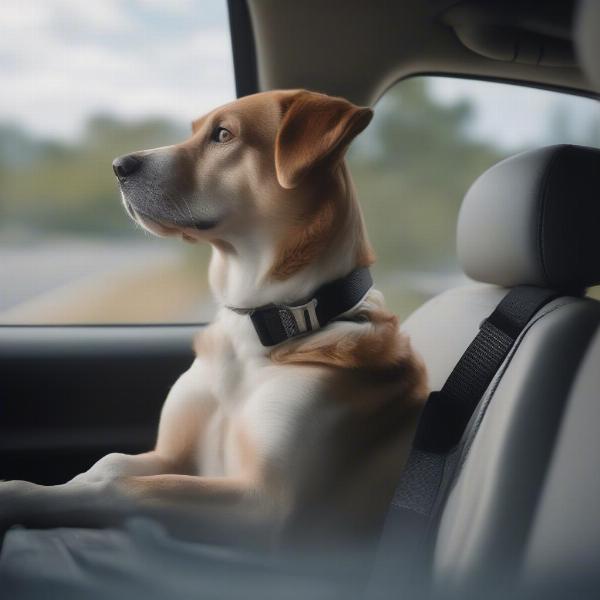While “gas station hot dog roller” might seem utterly unrelated to dog ownership, a closer look reveals a surprising connection. This seemingly bizarre search query likely stems from dog owners’ concerns about hygiene and food safety, especially when traveling. After all, who hasn’t been tempted by a quick, cheap snack at a gas station during a long road trip? But are those rotating hot dogs safe for us, let alone our furry companions? This article will delve into food safety concerns for dogs, particularly regarding processed meats like hot dogs, and offer healthier alternatives for on-the-go snacking.
Understanding the Risks of Processed Meats for Dogs
Processed meats, like those often found on gas station rollers, are typically high in sodium, nitrates, and other additives that can be detrimental to a dog’s health. High sodium intake can lead to dehydration, increased thirst, and even sodium ion poisoning in severe cases. Nitrates, while used as preservatives, have been linked to an increased risk of certain cancers in dogs. Furthermore, the high fat content in many processed meats can contribute to pancreatitis, a painful and potentially life-threatening inflammation of the pancreas.
Healthier On-the-Go Snack Options for Your Canine Companion
Instead of reaching for that questionable gas station hot dog, consider packing healthier, dog-friendly snacks for your road trip. Some excellent options include:
- Pre-portioned dry dog food: Convenient and readily available.
- Small pieces of cooked, lean meat: Chicken, turkey, or beef without any seasoning.
- Fruits and vegetables: Carrots, apple slices (remove the core and seeds), or blueberries. Always check for any potential allergies or sensitivities before introducing new fruits and vegetables.
- Commercial dog treats: Choose low-calorie, natural options without artificial flavors or colors.
What to Do If Your Dog Eats a Gas Station Hot Dog
If your dog manages to snag a gas station hot dog, monitor them closely for any signs of distress, such as vomiting, diarrhea, lethargy, or excessive thirst. Contact your veterinarian immediately if you notice any unusual symptoms. They can advise you on the best course of action based on your dog’s breed, size, and overall health.
Keeping Your Dog Safe During Road Trips
Beyond food safety, there are other essential considerations for safe and enjoyable road trips with your furry friend:
- Secure your dog in a crate or with a dog seatbelt: This protects both your dog and human passengers in case of an accident.
- Plan regular stops for potty breaks and exercise: This helps prevent accidents and keeps your dog from getting restless.
- Bring plenty of fresh water: Dehydration is a common concern during travel.
- Never leave your dog unattended in a hot car: Even on mildly warm days, the temperature inside a parked car can quickly become deadly.
 Dog safely secured in a car
Dog safely secured in a car
Conclusion: Prioritize Your Dog’s Health on the Road
While the allure of a gas station hot dog might be strong for us humans, it’s crucial to prioritize our dogs’ health and avoid feeding them processed meats. By packing healthy, dog-friendly snacks and taking necessary safety precautions, you can ensure a happy and healthy road trip for both you and your furry companion. Remember, a little preparation can go a long way in keeping your dog safe and well-fed on the go.
FAQ:
- Are hot dogs ever safe for dogs? Plain, cooked hot dogs in very small quantities are occasionally acceptable, but they should not be a regular part of a dog’s diet.
- What are the signs of pancreatitis in dogs? Vomiting, diarrhea, lethargy, abdominal pain, and loss of appetite are common signs.
- What are some other good travel snacks for dogs? Freeze-dried liver treats, plain cooked sweet potato, and plain rice cakes are healthy alternatives.
- How often should I stop for potty breaks during a road trip with my dog? Every 2-3 hours is a good general guideline.
- What should I do if my dog gets carsick? Consult your veterinarian, who may recommend medication or other remedies.
- Can I give my dog human medication for car sickness? No, never give your dog human medication without consulting your vet.
- What is the best way to secure my dog in the car? A crash-tested dog crate or a dog seatbelt harness attached to the car’s seatbelt system are the safest options.
About ILM Dog: ILM Dog is your trusted resource for all things dog-related. We provide expert advice on Dog Breeds and Selection, Health and Medical Care, Training and Behavior, Nutrition and Feeding, Grooming and Hygiene, and Products and Accessories. Whether you’re a seasoned dog owner or just starting your journey, we’re here to help. Contact us for expert advice and support: Email: [email protected], Phone: +44 20-3965-8624.